What's New
Displaying results 2601 - 2610 of 4052
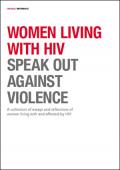
Resource | Publications,
Women living with HIV have a unique perspective on the AIDS epidemic. Similarly, women who have personally experienced violence can inform the debate on how to stop violence against women in a way that no others can. Together, they can provide valuable insight and experiences to end the AIDS epidemic and violence against women.
This collection of essays by women living with and affected by HIV sheds light on the experiences of women living with HIV in overcoming and addressing violence against women.
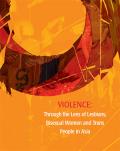
Resource | Publications,
Lesbians, bisexual women and transgender (LBT) individuals in Japan, Malaysia, Pakistan, the Philippines and Sri Lanka face violence and exclusion in every sphere of their lives. This violence is fueled by laws that criminalize same-sex relations and gender non-conformity and encouraged by governments who tolerate, endorse, or directly sponsor the violent clamp-down on those who do not follow prevailing norms on sexual orientation, gender identity and gender expression.
This is the main finding from research coordinated by the International Gay and Lesbian Human Rights Commission (IGLHRC) and conducted over a two-year period by women’s rights, sexuality rights and gender rights activists based in Japan, Malaysia, Pakistan, Philippines and Sri Lanka. The researchers uncovered high levels of family violence perpetrated against LBT individuals as well as widespread discrimination in education, health and work sectors.
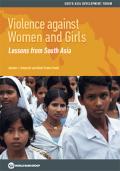
Resource | Publications,
This report examines the prevalence and the factors associated with various types of violence against women and girls in South Asia (Afghanistan, Bangladesh, Bhutan, India, Maldives, Nepal, Pakistan, and Sri Lanka). The report also highlights the gaps where intensive research or interventions might be undertaken. Its focus, themes, and organization, as well as its content and analyses, have benefited greatly from consultation, guidance, and direct inputs from experts in the public, nongovernmental organization (NGO), private, donor, and research sectors of South Asia. This report is one component of the World Bank’s regional program, launched in January 2013, to attend to issues of gender-based violence in its operations, analytics, and collaborative work with other practitioners in South Asia.
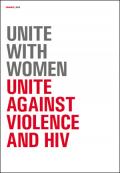
Resource | Publications,
Violence against women is a violation of their human rights. It has profound psychological and physical effects that can result in permanent disability and death. More than one in three women become victims of violence in their lifetime. According to WHO, nearly one third of all women have been physically and/or sexually violated by their intimate partner and almost 40% of all murders of women worldwide are committed by their partners.
As recognized in the Universal Declaration on Human Rights and reaffirmed in multiple international conventions and regional agreements, all human beings have the right to bodily integrity and to be free from violence. In 2011, United Nations Member States recognized the link between HIV and violence against women, with a call to end gender-based abuse and violence.
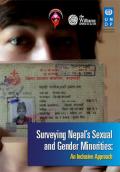
Resource | Publications,
The survey attempted to take advantage of Nepal’s attempt to include a third gender category in its national census, the first such attempt in the world. Nearly 1,200 respondents were recruited by trained BDS outreach workers whose aim was to study the identity, demographics, and experiences of sexual and gender minorities in Nepal. The study participants came from 32 of Nepal’s 75 districts, spoke Nepali, Bhojpuri, and Maithill, were primarily Hindu, and included individuals from 150 caste and ethnic groups.
The survey reveals that LGBT people in Nepal continue to face a wide range of obstacles as individuals and as a community. These challenges include widespread bullying in schools, lack of protection from discrimination by employers, paucity of programming to address the reproductive health needs of lesbians, and the lack of sensitive HIV healthcare for transgender women and gay men who are at exponentially higher risk of HIV infection than the general population.
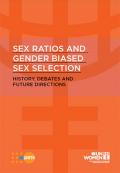
Resource | Publications,
The discourse on gender biased sex selection in India has evolved over time from the realm of private spaces to that of public policy. India’s experience in dealing with the issue offers many valuable lessons for the global community. This assumes special significance given the increasing imbalance in sex ratios in the early age groups observed in countries in South, East and Central Asia, and Eastern Europe.
The study maps existing evidence on gender biased sex selection in the Indian context, weaving in significant social debates and policy developments that have influenced perceptions, and pathways to action. It offers practical suggestions to advance the path of critical inquiry by focusing on different domains such as family and household, education, labour and employment, and on institutions that directly or indirectly aid or combat the practice of sex selection.
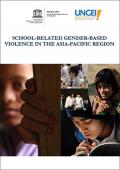
Resource | Reviews and Snapshots,
Gender-based violence (GBV) is a fundamental violation of human rights. It is one of the worst manifestations of gender-based discrimination, disproportionately affecting girls and women. GBV is a global phenomenon that knows no geographical, cultural, social, economic, ethnic, or other boundaries. It occurs across all societies, and is a major obstacle to the achievement of gender equality.
The purpose of this review is to examine existing approaches in policy, programming and implementation responses to school-related gender-based violence (SRGBV) in the Asia-Pacific region. It seeks to advance our knowledge and learning in this field, both in terms of what we know about the phenomenon and its impact on individuals, as well as how best to address it, including through education.

Resource | Infographics,
Gender-related violence in schools is a violation of human rights that also raises additional barriers to learning and can adversely affect the health of young people. In extreme cases it can even drive young people to suicide. Studies also show that violence begets violence, perpetuating a vicious cycle that can last generations.
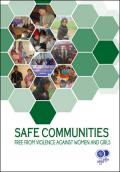
Resource | Publications,
Violence against women has been acknowledged as a major barrier to sustainable human development and a serious impediment to achieving gender equality. It imposes a tremendous economic cost to the countries in the form of absenteeism from productive work, increased health care expenditures, and taxing public services – police, courts, and social welfare. At the same time, it dehumanizes the perpetrators unleashing a cycle of violence that erodes the core of their well-being.
All the countries of South Asia are committed to ending violence against women and children and are signatories to CEDAW and the Convention on the Rights of the Child (CRC). Violence against women remains one of the region’s most pervasive human rights challenges. It is estimated that one in every two women in South Asia faces violence in her home1 as compared to the world average of one in three.
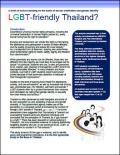
Resource | Publications,
In many Western and Asian contexts, over half of LGBT students report having been bullied because of their same-sex attraction or because of their transgender expressions.
Thailand is often perceived by both foreigners and some of its own population as very accepting of sexual and gender diversity; however some research suggests that Thai society is "tolerant but unaccepting" toward LGBT individuals. Previous studies were conducted on school bullying in Thailand, but only anecdotal evidence revealed the presence of targeted violence toward LGBT students due to their sexual orientation and/or gender identity.
This study aimed to fill this gap in evidence, and to identify policy and programme implications.





